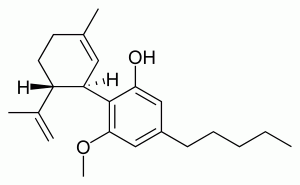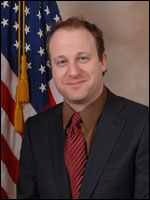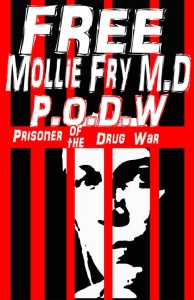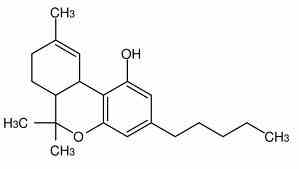
Cannabidiol
5/25/2011 – Cannabidiol (CBD) is a non-psychotropic compound found in the Cannabis plant that is currently being exploited by researchers for its therapeutic properties. CBD is usually the second most abundant compound found in the plant.
A research team devoted to studying the effects of Cannabidiol (CBD) on the immune system has made a series of breakthroughs that may have uncovered a mechanism of CBD’s actions (Kozela 2009, Rimmerman 2011, Juknat 2011). The team may have discovered the specific genes responsible for some of CBD’s therapeutic effects. This type of research could be a big leap forward.
Previously the same team had shown that CBD can effectively treat the symptoms of Multiple Sclerosis in mice. This is in agreement with earlier research published by other labs throughout the world.
This collective body of research demonstrates that CBD that is isolated from the plant (as well as Cannabis preparations containing CBD) have been shown to ameliorate the symptoms of multiple sclerosis in animal models and clinical trials. The effects of CBD on disease progression include decreased inflammation, neuronal protection, and decreased immune cell activity.
In other words, this is even more science that shows how CBD from natural cannabis plants works to treat MS in animals and humans.
Now for the interesting genetic details. CBD can affect the genes Soat2 andCyp27a1, which control sterol metabolism (Ex. Cholesterol). These are part of a larger group of genes, known as stress genes. The well-known cannabinoid THC does not appear to have any effect on these genes.
Anandamide is a natural compound made by mammals from lipids, in a sense it is the “natural THC” found in our brains and throughout the human body. Anandamide and THC act through the cannabinoid receptors and have similar effects. For example THC and Anandamide have similar effects on pain, appetite, and memory.
Special receptors allow THC and Anandamide to work, but CBD does not interact directly with cannabinoid receptors.
Additionally, this research team found that CBD can increase the amount of Anandamide and other important lipids.
There are dozens of cannabinoids in the Cannabis plant. Much attention has been paid to THC over the years because of its euphoric side-effect. Researchers are now very interested in the abilities of CBD because it works so effectively without causing impairment.
 Jahan Marcu is currently investigating the pharmacology of cannabinoid receptors. He was working at the California Pacific Medical Center Research Institute when exciting discoveries were made showing enhanced anti-cancer effects with THC and CBD from the Cannabis plant. The findings were published in the Journal of Molecular Cancer Therapeutics. In 2009 he received the Billy Martin Award from the International Cannabinoid Research Society (ICRS). Jahan is currently the vice-chair the Medical and Scientific Advisory Board at Americans for Safe Access (ASA). Contact: science { at } freedomisgreen.com
Jahan Marcu is currently investigating the pharmacology of cannabinoid receptors. He was working at the California Pacific Medical Center Research Institute when exciting discoveries were made showing enhanced anti-cancer effects with THC and CBD from the Cannabis plant. The findings were published in the Journal of Molecular Cancer Therapeutics. In 2009 he received the Billy Martin Award from the International Cannabinoid Research Society (ICRS). Jahan is currently the vice-chair the Medical and Scientific Advisory Board at Americans for Safe Access (ASA). Contact: science { at } freedomisgreen.com
DISCLAIMER: The views and opinions expressed are those of the author and do not necessarily represent any University, business or affiliates. While the information provided in this blog is from published scientific studies it is not intended to diagnose or treat any disease.
 7/4/2011 – This week the residents of the Constitution State are gaining back some of the liberty that was created 235 years ago. Connecticut Gov. Dannel P. Malloy signed a law that removes criminal penalties for possession of up to 1/2 ounce of marijuana. Adults caught with 14 grams of pot or less are now given a $150 fine on the first occasion and $200-$500 for additional offenses. Those between the ages of 18-21 will need to appear in court and will also have their drivers’ license suspended for 60 days.
7/4/2011 – This week the residents of the Constitution State are gaining back some of the liberty that was created 235 years ago. Connecticut Gov. Dannel P. Malloy signed a law that removes criminal penalties for possession of up to 1/2 ounce of marijuana. Adults caught with 14 grams of pot or less are now given a $150 fine on the first occasion and $200-$500 for additional offenses. Those between the ages of 18-21 will need to appear in court and will also have their drivers’ license suspended for 60 days.











